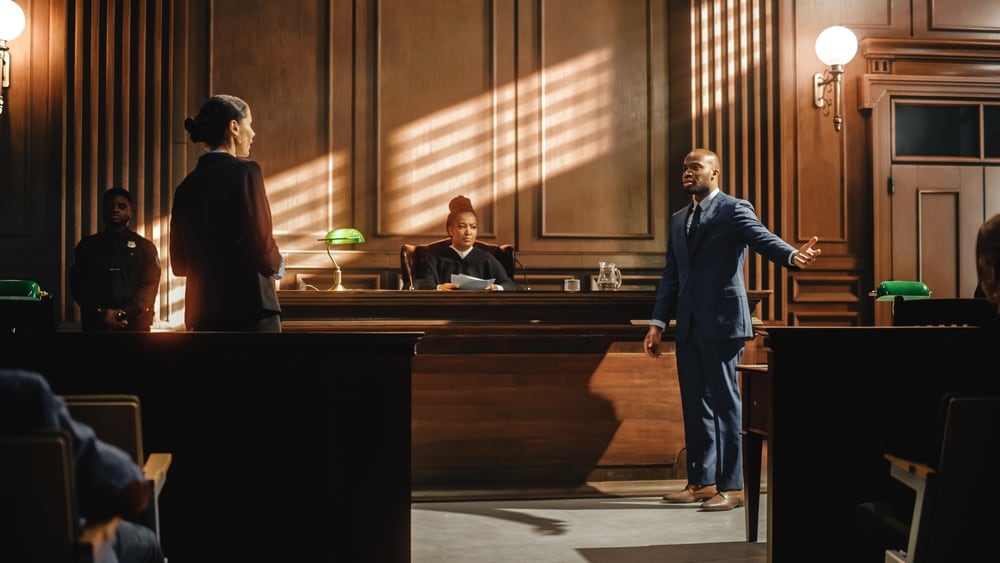By Josh Hamilton on

Domestic violence cases hinge on the victim’s firsthand account. Their presence allows them to directly confront the accused and strengthens the prosecution’s case. It also gives them a voice in the legal process, promoting a sense of empowerment and closure.
But what happens if the victim chooses not to appear in court? This post answers that question. Discover the consequences of what happens if a domestic violence victim fails to appear in court. Understand the role of prosecutors and how it impacts the case. Learn how the Law Office of Hernandez | Hamilton | Lamoureux with domestic violence cases.
Possible Consequences
When a domestic violence victim refuses to testify in court, it doesn’t necessarily mean the case is over. Unlike popular belief, the victim doesn’t decide whether to press domestic violence charges, the prosecutor does. Even if the alleged victim recants or refuses to testify, the prosecutor can still file a domestic violence charge against the alleged abuser. The question becomes whether there’s enough other evidence to prove the case beyond a reasonable doubt. The following are possible consequences.
Impact on the Case Outcome
The victim’s testimony is often the cornerstone of a domestic violence case. Here’s how their absence can affect the outcome:
Reduced chance of conviction
If the victim’s testimony is the key piece of evidence and there’s minimal supporting evidence (medical records, witness accounts), the case might be dismissed entirely. Their absence weakens the prosecution’s case and makes it difficult to prove the alleged crime beyond a reasonable doubt.
The trial may proceed with strong supporting evidence
Prosecutors can still pursue the case if there’s strong supporting evidence, such as:
- Witness testimonies from people who saw the abuse or its aftermath
- Police reports detailing the incident and officer observations
- Medical records documenting injuries sustained during the abuse
- Photographic evidence of injuries
A strong case with this kind of evidence can still lead to a domestic violence conviction, but it can be more challenging and may result in a less severe sentence.
Consequences for the Victim
There can also be serious consequences for the victim if they were subpoenaed (a legal order to appear):
Warrant for arrest
In rare cases, a judge may issue a warrant for the victim’s arrest if they fail to appear without a valid reason. However, this is usually a last resort, as the court prioritizes the victim’s safety.
Charges for filing a false report
If the victim shows up but recants their original statements in court, they might face charges of filing a false police report. This can be a complex situation, and courts consider the reasons behind the recantation.
The consequences of a domestic violence victim failing to appear in court not only affect the outcomes but might also lead to arrest and charges.

Steps The Court May Take When A Victim Doesn’t Show Up
When an alleged victim fails to appear in court, the judge has several options:
- Adjournment and Continuance
The most common step is to postpone the proceedings. This allows time to locate the victim and discover the reason for their absence. The court may attempt to contact the victim directly or work with the prosecutor to locate them.
- Assess the Evidence
The judge will evaluate the existing evidence, including police reports, medical records, and witness testimonies. If this evidence is strong enough, the case may proceed without the victim’s testimony.
- Issue a Subpoena
A subpoena is a legal order that requires someone to appear in court or provide evidence for a case. If the victim’s location is unknown or they haven’t been subpoenaed yet, the judge may issue a subpoena compelling them to appear in court.
- Issue a Bench Warrant
As a last resort, the judge may issue a warrant for the victim’s arrest if they have been subpoenaed and fail to appear without a legitimate excuse. However, the court prioritizes the victim’s safety, and this option is used cautiously.
The court’s primary concern throughout this process is ensuring the victim’s safety and upholding a fair legal process.
Role Of Prosecutors In Handling Cases Without The Victim’s Cooperation
Domestic violence cases without victim cooperation present a challenge for prosecutors. Despite this hurdle, the prosecutor must take proactive measures to carry on the case effectively. Here’s how they navigate these situations:
- Evaluating the Evidence: Prosecutors assess the existing evidence – police reports, witness testimonies, medical records, and physical evidence like photographs. A strong case built on this evidence allows them to argue for prosecution even without the victim’s direct testimony.
- Investigative Efforts: Prosecutors may work with law enforcement to gather additional evidence that strengthens the case. This could involve interviewing neighbors, friends, or family members who may have witnessed the abuse or its aftermath.
- Victim Support and Communication: Prosecutors often work with victim advocates to understand the reasons behind the victim’s absence. They may also attempt to reach out to the victim directly, offering support and resources to encourage their participation.
- Considering Alternatives: In some situations, prosecutors may explore alternative solutions like plea bargains or diversion programs, depending on the severity of the case and the specific circumstances.
While a victim’s absence makes prosecution more difficult, skilled prosecutors can leverage other evidence and resources to hold perpetrators accountable.

Importance Of Victims’ Rights And Providing Resources For Support
In cases where a domestic violence victim doesn’t appear in court, acknowledging the importance of victims’ rights and providing resources for support ensures:
Empowerment and Support
Victims have the right to be informed about court proceedings and to receive support throughout the legal process. Offering resources such as victim advocacy services, counseling, and legal aid can empower victims and encourage their participation in court hearings.
Assuring Safety
Victims have the right to safety and protection. Their absence in court may be influenced by fears for their safety. It is essential to provide a supportive environment and access to protective measures to address these concerns.
Respecting Autonomy
Respecting the autonomy of victims is paramount. It’s crucial to understand the complex factors that may contribute to their non-appearance and provide resources to address these challenges.
Importance of Testimony
Acknowledging the significance of the victim’s testimony in domestic violence cases highlights the importance of providing resources and support to ensure their presence in court, enabling them to contribute to the pursuit of justice.
In essence, prioritizing victims’ rights and providing support resources underscore a commitment to justice and empowers victims to navigate the legal system with dignity and assistance.
Options available for victims who are unable or unwilling to attend court
When domestic violence victims are unable or unwilling to attend court, several options can be considered:
Remote Testimony
Courts may allow victims to provide testimony remotely, ensuring their input without physically being in court.
Victim Advocacy Services
Victims can benefit from advocacy services that offer support, guidance, and information on available resources, empowering them to navigate the legal process.
Legal Representation
Victims can seek legal representation to ensure their interests are safeguarded in court, even if they are unable to attend in person.
Safety Measures
Courts can provide safety measures and accommodations to address concerns about attending court, ensuring the physical and emotional well-being of the victims.
Continuance and Rescheduling
Courts may consider granting continuances or rescheduling hearings to accommodate the victim’s availability and readiness to participate.
These options are pivotal in guaranteeing that victims’ voices are heard and their rights are upheld, even in situations where appearing in court may be challenging.
Importance Of Communication In A Domestic Violence Case
In domestic violence cases, communication between victims, their attorneys, and the court is of paramount importance for several reasons:
Facilitates Legal Representation
Attorneys translate legalese, explain options (like restraining orders), and address concerns. Open communication allows victims to ask informed questions and feel empowered throughout the process.
Safety and Support
Victims share details about the abuse, allowing the attorney to prioritize safety concerns. This information guides decisions about temporary housing, witness protection, and building a strong case.
Evidence and Testimony
Clear communication ensures victims feel comfortable providing details used for evidence. This can include witness testimonies, medical records, or describing the abuse. The attorney then presents this evidence effectively in court.
Informed Decision-Making
Victims and attorneys work together to inform the court about the victim’s specific needs. This empowers the judge to make informed decisions regarding protective measures, consequences for the abuser, and potential long-term safety plans.
Upholding Victims’ Rights
Communication ensures victims understand their rights throughout the case. They can voice concerns, express preferences, and be involved in decisions that impact their safety and well-being.
In summary, choose an attorney experienced in domestic violence law who is a good communicator to increase the case-winning odds.
Choose the Law Office of Hernandez | Hamilton | Lamoureux
Choose the Law Office of Hernandez | Hamilton | Lamoureux for dedicated representation in domestic violence cases. Specializing in defending clients accused of such offenses, we prioritize protecting victims’ rights. With our extensive knowledge and experience, trust us to handle your case sensitively and effectively. Contact us today for free consultation and expert legal support.
Back to Blog